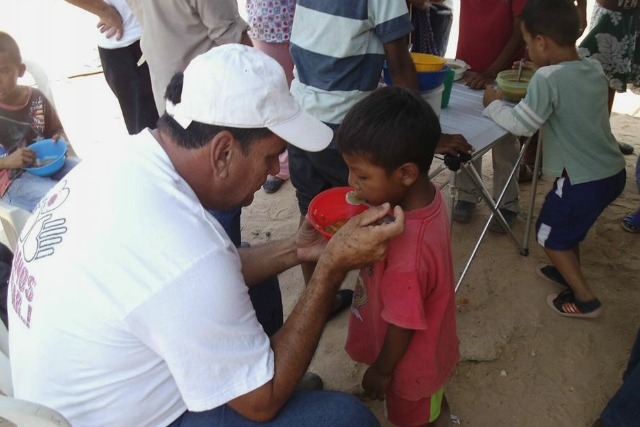Friday, Caritas Venezuela received a request that is becoming all too familiar: people and hospitals in need of basic medical supplies in order to perform routine medical procedures. Staples such as bandages and medications, even distilled water for the nebulizers used in asthma treatment, have become almost impossible to source. On Friday it was the public hospital that was all out of IV drips. Fortunately Caritas had some in stock.
“For lack of something as simple as an IV bag, people can die,” said Caritas Venezuela Director Janeth Márquez. “The pharmaceutical chamber says that there is currently a 90 percent shortfall of medications because there is a shortage of raw materials. If before 100 people a month came asking for medical help, that is now multiplied by 100. People are coming to us for help with diabetes, cholesterol and high blood pressure.”

When the crisis first hit and stocks began to dry up Caritas Venezuela relied on the goodwill of people to donate any excess medications they had on hand. Credit: Caritas Venezuela
Oil accounts for 95 percent of Venezuela’s export earnings and rock bottom oil prices have hit the Latin American nation hard. The International Monetary Fund estimates that the economy contracted by 10 percent and that runaway inflation currently at 275 percent is expected to reach 720 percent by the end of the year.
Widespread drought further compounds matters. Precariously low water tables are straining the electrical grid that runs primarily on hydroelectric power. Stringent energy saving measures have gone into effect including an official two-day workweek for public servants. Mandatory blackouts throughout the country cripple commerce on a daily basis.
For Venezuela’s poor that means they are caught between a supply shortage and skyrocketing prices for what can be found on the market. “There are some medications where maybe we used to get two requests and now we get 1,000,” said Márquez.
When the crisis first hit and stocks began to dry up Caritas Venezuela relied on the goodwill of people to donate any excess medications they had on hand. That medicine was redistributed to those in need, but chronic illness requires continuous care and the stock of basic medicines for things such as seizures, cholesterol, and high blood pressure have run dry.
Without a functioning healthcare system to help stave off the spread of disease it falls to organisations like Caritas to pick up the slack. Vector-borne diseases such as malaria, chikungunya and Zika are on the rise. It’s estimated that Venezuela may have as many as 500,000 Zika cases, a number that is expected to rise without the necessary health infrastructure in place to help stop its spread.
Proper hygiene becomes a crucial safeguard to public health. Caritas has introduced handmade water filters to help families access safe water for their daily use. The technology, borrowed from fellow Caritas organisations in Africa, helps keep families healthy at a time when people could die from otherwise preventable diseases.
Malnutrition is also on the rise. Caritas recently had to reopen soup kitchens for malnourished children. Over a decade ago malnourishment was at an all-time low, making the feeding centre obsolete. Rising food costs coupled with severe food shortages are causing families to take extreme coping measures in order to survive.
“It takes more than 10 times the minimum wage to purchase the basic bread basket,” said Márquez. “Children are fainting from hunger at school. Absenteeism is on the rise. Teachers say that their children are distracted. Out of 40 students 20 don’t attend because they have no food.”
“What’s the most painful is that we once had food banks filled with stock, and now I can say we have nothing,” says Márquez. “Not even 10 kilos to give people. Up until now we’ve relied on the tremendous generosity of people. They can wait in line anywhere from 12 to 24 hours to receive 2 kilos of rice or flour. Even within this shortage people would bring items to the Church. This month, however, we’ve received practically nothing.”
Local factories, once generous donors to the Church’s food pantry, are being forced to close down operations. The Coca-Cola Company recently shut down manufacturing of its signature drink due to a sugar shortage, and Polar, the local brewery, had to close down four plants because of lack of barley— a move that cost 10,000 their jobs and affected up to 300,000 people.
With many Venezuelans eliminating meals from their day Caritas has devised a book of recipes with suggestions of how Venezuelans can stretch their pantries and nourish their families in times of crisis. In the meantime the Church is working to persuade the government to open a humanitarian corridor in order to allow entry of food and medical supplies— a request that has been stalled by the shortened workweek of government officials.
A generation of Venezuelan children is growing up without proper healthcare or nutrition. The first 1,000 days of life from the womb to the age of 2 are critical in their development and a person’s long-term success. “Their quality of life is suffering,” said Márquez of Venezuelan children. “This will have repercussions on the future of our country. This is a crisis whose consequence we will also pay in the future.”
“As Caritas we have one message,” says Márquez. “We work with everyone whether they are atheist, Catholic, Chavezitas or members of the opposition. We open our doors as we are called to do so as the Church.”

